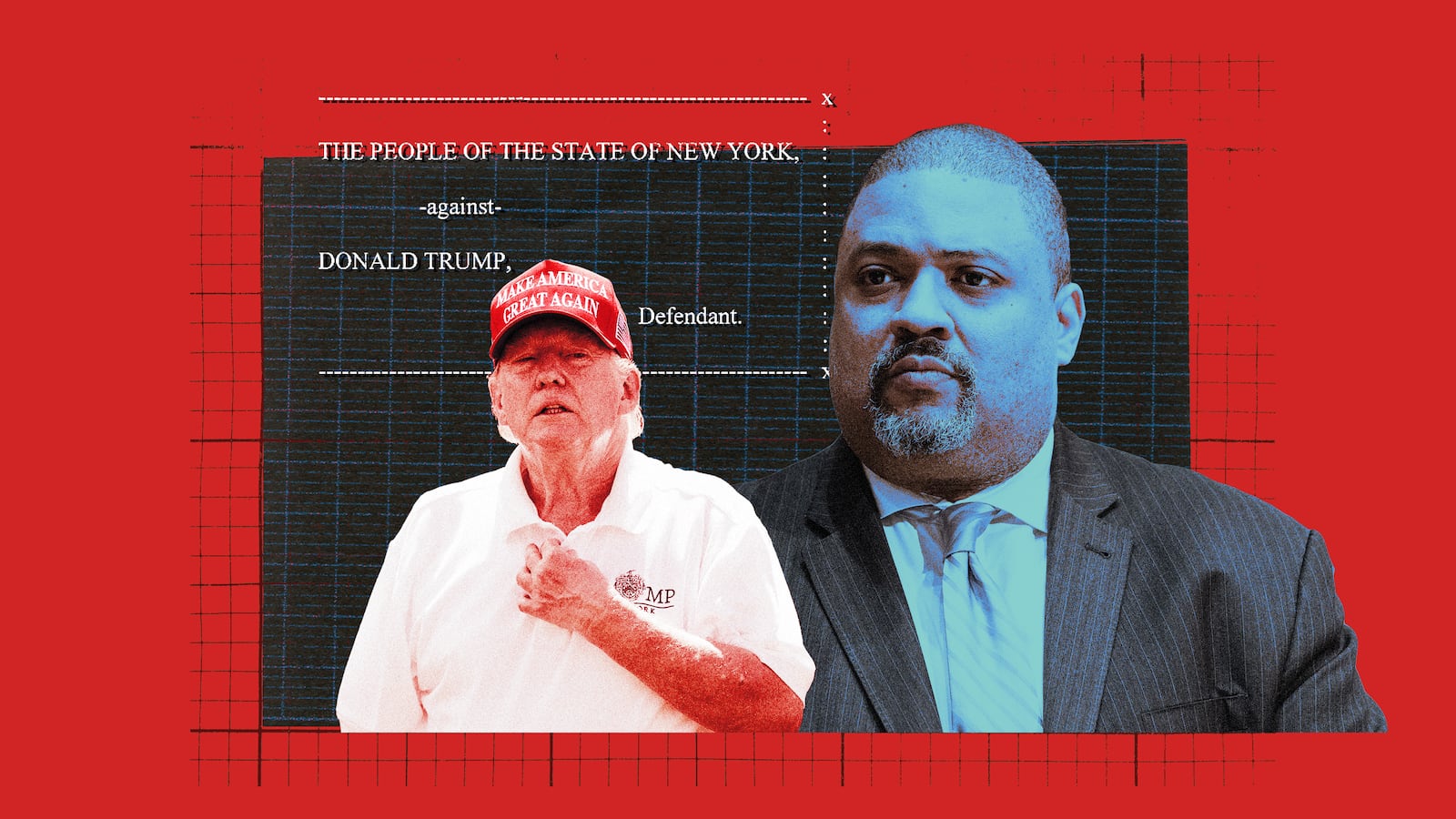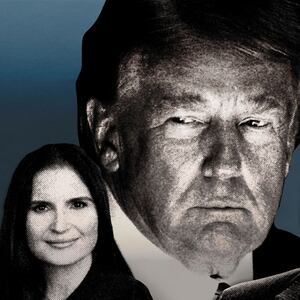Donald Trump’s attempts this summer to drag his porn star-hush money case away from New York’s state courts and once again hide behind his presidential credentials has given Manhattan prosecutors a little-noticed ace in their pocket—one they can now use to bolster their case.
For months, critics of Manhattan District Attorney Alvin Bragg Jr.’s case have called it weak because the case criminally charges Trump with faking business records—a lowly misdemeanor only bumped up to a felony on a technicality.
Except that Trump’s ploy to move the case to federal court gave a judge there the opportunity to take the first swing. And he used that opportunity to make it clear that the case against Trump is far more serious than it otherwise seems—and that the burden for proving that Trump’s alleged falsification of business records are felonies is low.
“The DA has been clobbered in the press, but this is… a seal of approval on the indictment,” said John Moscow, a renowned former New York prosecutor now in private practice at the firm Lewis Baach Kaufmann Middlemiss.
There will be renewed attention on the judge’s order in the coming weeks as Manhattan prosecutors are expected to cite it to keep the case barreling toward trial in March 2024—thus far, the most disruptive trial on Trump’s calendar as he vies for the Republican presidential nomination.
When Trump was first slapped with criminal charges in Manhattan, he viciously attacked DA Bragg and the state judge assigned to his case, New York Supreme Court Justice Juan Merchan. The former president insulted them as leftist hacks, posted a picture that implied he’d hit the DA over the head with a baseball bat, and even made derogatory comments about the judge’s daughter.
It was no surprise, then, that Trump tried moving the case to federal court, where any trial appeals would lead straight to the Supreme Court, which has a 6-to-3 conservative majority sustained by three people Trump placed there while president.
For Trump, it also helped that the DA is trying to nail him for actions that touched on federal issues. After all, Trump is accused of faking business records that kept the porn star Stormy Daniels from speaking out about their sexual affair—all in the service of sparing his presidential campaign from potentially calamitous embarrassment during a national, and thus federal, election. And the Trump Organization got to log payments to Michael Cohen, the lawyer who negotiated that secret deal, as a business expense—a potential deduction on federal taxes.
But at a hearing in June, an irascible U.S. District Judge Alvin K. Hellerstein rebuffed Trump’s plans, with the judge becoming increasingly exasperated the more he detailed the weird business arrangement between Trump and Cohen. In court, Hellerstein described how Cohen apparently had some sort of typical attorney retainer agreement—except it didn’t exist. And on the stand, Trump Organization corporate lawyer Alan Garten bizarrely explained how there wasn’t any official paperwork to back that up.
“He testified that he was not aware of any retainer agreement with Cohen, that Cohen's invoices did not contain descriptions of the work he did, and that the ledger entries for Cohen similarly did not describe his work,” the judge later wrote incredulously. “Garten testified that he did not know if Cohen actually worked on any matters referred to him by the Trump Organization.”
The more significant findings in Hellerstein’s July 19 order, however, relate to the way he stated, in no uncertain terms, that the DA’s case is solid—and that Trump can’t hide behind the presidential seal.
As it turns out, paying off a porn star like Stormy Daniels (privately known as Stephanie Clifford) isn’t a president’s job.
“Whatever the standard, and whether it is high or low, Trump fails to satisfy it,” Hellerstein wrote. “Trump has not explained how hiring and making payments to a personal attorney to handle personal affairs carries out a constitutional duty. Reimbursing Cohen for advancing hush money to Stephanie Clifford cannot be considered the performance of a constitutional duty.
“Falsifying business records to hide such reimbursement, and to transform the reimbursement into a business expense for Trump and income to Cohen, likewise does not relate to a presidential duty. Trump is not immune from the People’s prosecution in New York Supreme Court.”

The judge also noted there is an “outer perimeter” to an American president’s authority, borrowing the same language the Department of Justice used in March when it similarly snatched that excuse away from Trump when it decided that a government official’s sovereign immunity doesn’t protect them from “incitement of imminent private violence,” like the kind seen during Trump’s attempted coup on Jan. 6, 2021.
But in kicking the case back to state court, Hellerstein went much further than just saying that federal laws here don’t preempt New York state laws. He actually emphasized that the DA doesn’t even need to prove the underlying crimes that bump it up to felony status—like tax dodging or election fraud.
“The only elements are the falsification of business records, an intent to defraud, and an intent to commit or conceal another crime. The People need not establish that Trump or any other person actually violated [New York or federal election laws,]” Hellerstein wrote. “Trump can be convicted of a felony even if he did not commit any crime beyond the falsification, so long as he intended to do so or to conceal such a crime.”
Hellerstein even tightened it up in case Trump’s lawyers seek an appeal in state court, noting how the 8th Circuit federal appellate court in the Midwest upheld Minnesota’s attempts to crack down on the GOP donation website WinRed for potentially violating that state’s consumer protection law.
Trump’s lawyers have appealed Hellerstein’s decision at New York City’s gleaming federal court tower, but as of now, the case is squarely back at the dingy Manhattan criminal courthouse a few blocks away. The former president has until the end of September to ask Justice Merchan to dismiss the case, and the Manhattan DA’s office will have two weeks to push back on that.
Neither side responded to a request for comment on this story.
Moscow, a former prosecutor at that office, noted that the federal judge didn’t tell prosecutors Susan Hoffinger, Matthew Colangelo, and their colleagues anything they didn’t already know. But now the state court judge has something he can easily point to.
“It’s critical. You don’t need to prove anything except an intention to aid or conceal a crime,” Moscow said. “Anyone who’s literate will understand that it’s a crime. Thirty four felonies!”







